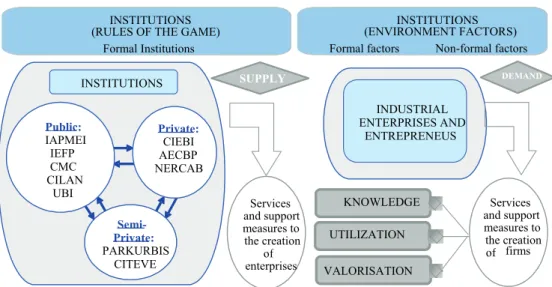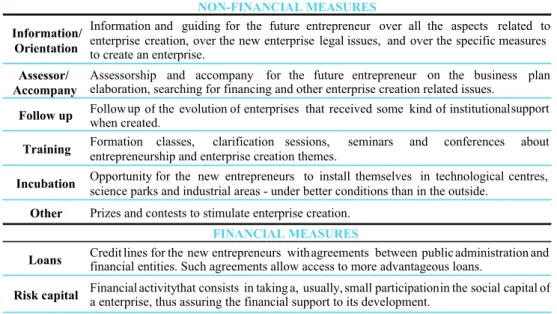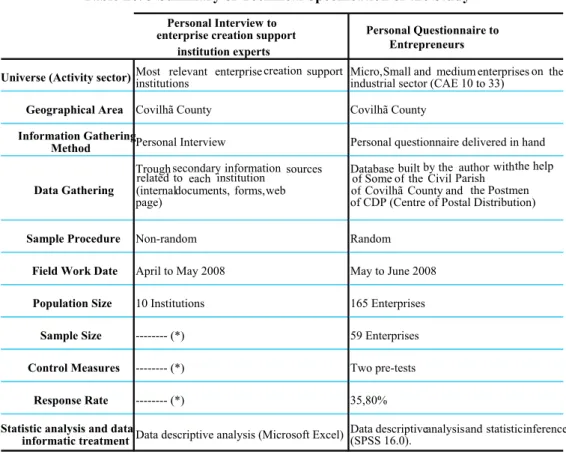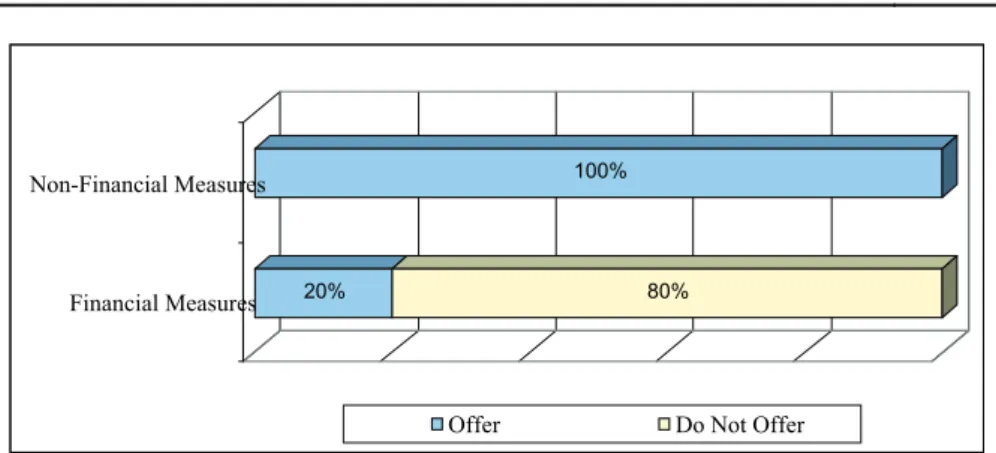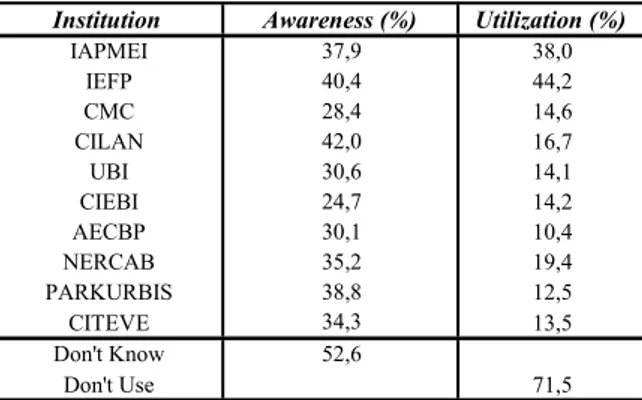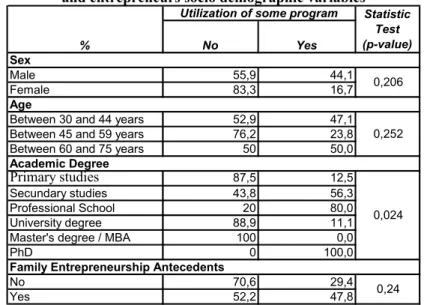INSTITUTIONAL APPROACH AND ENTERPRISE CREATION: SUPPORT
SYSTEMS IN THE CASE OF SMALL CITY IN RURAL AND PERIPHERAL
AREAS OF PORTUGAL
Maria Jose Silva1∗, Virgínia Trigo2 and Rute Antunes3 1) 3) University of Beira Interior (UBI) and NECE, Covilhã, Portugal
2)ISCTE-IUL, Business School, Lisbon, Portugal
Abstract
The research aims to identify and analyse the formal institutional factors in the environment that constrain the creation of industrial enterprises in small city in rural and peripheral areas of Portugal, namely Covilhã County. It has as reference sources several approaches about enterprise creation and institutional economic theory due to their adequacy to the study of the factors that influence enterprise creation by encompassing institutions, services, programs and support measures. With this analysis we try to evaluate the extent to which entrepreneurs know about and employ the available institutional programs/services. Investigation hypotheses are formulated and subject them to empiric tests. The results, from the offer point of view of the services/programs, show that, duplication of resources and efforts on the part of institutions in the region often occurs making coordination more difficult and alienating the demand (entrepreneurs). From the view point of the demand, we noticed that entrepreneurs may have a broad awareness of the institutions, but this does not imply that they use their programs and services. Therefore recommendations are made having in view a better coordination among the different institutions involved so that the programs they offer can be more effective in the future.
Keywords: entrepreneurship, enterprise creation, institutions, institutional economic theory JEL Classification: L26
Introduction
New business formation is referred to in the literature about entrepreneurship as one of the factors responsible for economic growth, employment generation of innovation, renewal of the economic structure and improvement of global competitiveness of regions and countries
∗ Corresponding author, Maria Jose Silva - msilva@ubi.pt
NECE - Research supported by: Unidade de I&D financiada pelo Programa de Financiamento Plurianual das Unidades de I&D da FCT - Fundação para a Ciência e Tecnologia, do Ministério da Ciência, Tecnologia e Ensino Superior.
(Birch, 1979, 1987; Drucker, 1986; Birley, 1987; Acs and Audretsch, 1988; Hisrich e Peters, 1989; Kirchhoff e Phillips, 1988, Storey, 1982, 1994; White and Reynolds, 1996; Kent, 1982; Sexton, 1986; Dubini, 1989; Porter, 1990; Wennekers and Thurik, 1999; Reynolds et al., 2003; Acs et al., 2004; Parker, 2004, among many others).
Assistance to business start-ups makes the business formation assume a role of evidence and major importance not only at a socio economic level, but also at a political level. With effect, the government, the public administration, both European and national, have stipulated measures and support programs towards the creation of new enterprises and promotion of the entrepreneurial spirit.
According to the economical context Portugal is facing and its current unemployment rates (National Institute of Statistics, 2010), which have increased lately, it is believed that the promotion of entrepreneurship enabling the creation of enterprises may be a solution that can contribute towards the reduction of the economic problems that have devastated the country, in general, and the rural districts in particular. These rural districts are peripheral areas of Portugal, suffering from problems associated with depopulation and poor perspectives for growth inland (Mota, Maçãs Nunes and Fernandes de Matos, 2010).
Thus, in the Portuguese context it is fundamental to analyse the factors that can contribute towards the promotion of enterprise creation. In this way, more research is necessary in order to study the external, systematic and relational aspects of enterprise creation. In this sense, the institutional economic theory by Douglas North (1990) provides a theoretical framework able to analyse enterprise creation. This fact is corroborated by Veciana (1999:25) “institutional theory is undoubtedly the theory which currently provides the most consistent and suitable conceptual framework for the study of the influence of environmental factors on the business function and business creation.” The study published recently by Veciana and Urbano (2008) strengthens once more the selection of this theoretical framework due to the suitability it presents towards the study of factors that influence enterprise creation.
In the academic community, there has been a growing interest for the study of formal and informal institutional framework of enterprise creation in specific regions (Aponte, 2002; Díaz, 2003; Gómez, 2004; Gómez, Veciana and Urbano, 2004; Urbano 2006; Garrido and Urbano, 2007; Urbano, Díaz and Hernández, 2007). Nevertheless, in Portugal the existence of studies in this field is unknown for which it is necessary research that analyses the institutional framework of enterprise creation both regarding an offer point of view (institutions, measures and support services) and a search perspective of programs and services on behalf of current entrepreneurs and those who have recently created an enterprise.
Given the importance of enterprise creation and considering that the analysis of the formal institutional framework is a phenomenon which is yet little studied, mainly in Portugal, it was considered appropriate, either in academic terms or in practical terms, to study that phenomenon, through a specific region and in small city in rural and peripheral areas of Portugal, namely Covilhã County.
The main question of the study is the following: which are the formal institutional factors of the environment that determine the creation of industrial enterprises in small city in rural and peripheral areas of Portugal, namely Covilhã County? In order to reply to this question, research hypotheses which are object of empirical tests are formulated. These hypotheses
relate awareness, the usage and value attributed to services/programmes of the institutions, on behalf of the entrepreneurs with an enterprising activity, in the scope of enterprise creation.
The paper is structured in the following way: after this introduction, in section two there is a relevant literature review that studies the relation between formal institutional factors and the entrepreneurial activity. In that same section a conceptual model is proposed and the research hypothesis is formulated. In the following section the research methodology used to test the hypothesis is described. In the fourth section the findings are presented and discussed. Finally, in the fifth section the final conclusions regarding institutional offer and demand are presented and future research to be developed about this theme is suggested.
1. Literature Review
Currently there is more and more a constant worry about society and mainly about government and public administration, in what refers to economic growth, creation of new job positions and entrepreneurial innovation. The fact that the creation of new enterprises is seen as a way to solve unemployment problems (Birch, 1979, 1987; Birley, 1987; Kirchhoff and Phillips, 1988; Storey, 1982, 1994; White and Reynolds, 1996), of regional and economic development (Kent, 1982; Sexton, 1986; Dubini, 1989; Storey, 1994; Wennekers and Thurik, 1999; Reynolds et al., 2003; Acs et al., 2004; Parker, 2004, among many others), and promotion of innovation (Acs and Audretsch, 1988; Drucker, 1964, 1986; Hisrich and Peters, 1989) has attracted, with more intensity, the curiosity, the interest and sensibility of several entities and members of the society, in general, to deal with this theme. Assistance to business start-ups has attracted interest of several researchers, who assume that the use of business formation support mechanisms can have positive repercussions, as much for the number of firms created as for the improved survival rate of these firms (White and Reynolds, 1996; Storey, 2000; Boter and Lundström, 2001; Reynolds et al., 2003, Urbano, Diáz and Hernández 2007).
Given the contribution of new enterprises towards the economic and social development of a certain region or country, the study of factors that determine the creation of enterprises is of major importance. In this context, some researches that contemplate both analysis of formal and informal framework of enterprise formation are to be evidenced (Aponte, 2002; Díaz, 2003; Díaz, Urbano and Hérnandez, 2005; There are also other studies based on the analysis of formal institutional framework, developed in Catalonia (Urbano, 2003); Porto Rico (Veciana, Aponte and Urbano, 2001; Aponte, 2002) and in Colombian Caribe (Gómez, Veciana and Urbano, 2004) and which focused their study mainly in the identification and description of institutions that had a more significant role towards enterprise creation, as well as in the analysis of support measures offered by the institutions, awareness, use and valorization that potential entrepreneurs have on the support programs, and degree of adequacy between the offered measures and the real need of future entrepreneurs.
However, it should be mentioned that although there are several theoretical multiple approaches that focus enterprise creation (Shane and Venkataraman, 2000; Gartner, 2001; Ucbasaran et al., 2001; Aldrich and Martínez, 2001; Davidson and Wiklund, 2001), the
analysis of institutional intervention in the economic and social development only appears mentioned in the institutional theory (North, 1990, 2005). Pointing out that the aim of this investigation, regarding the approach adopted by other authors (Gibb, 1993; Smith, 1994; Malecki, 1997; Kolfsten and Scharberg, 1998; Young et al., 1999; Lerner and Harber, 2000; Urbano 2006), consists in the analysis through the institutional economic theory, of the formal framing of enterprise creation, identifying the support programs and institutions that exist in small city in rural and peripheral areas of Portugal, namely Covilhã County. In this sense, the focus of the research was centred on the analysis of institutional framework, according to the theoretical model proposed in figure no. 1.
Figure no. 1 Application of North Model on institutions to analyze the factors of the environment that determine the creation of industrial enterprises
Regarding the types of support measures towards business creation, there can be a distinction between general and specific measures. The measures of general character are those that refer mainly to norms and governmental regulations which affect business creation and, specific measures are those considered of non financial character (information/orientation, assessor/accompany, training, search, incubation) and of financial character (loans, risk capital and non returnable investment), as verified in table no. 1.
North Model North Model application to the creation of firms
INSTITUTIONS (RULES OF THE GAME)
Formal Institutions SUPPLY Services and support measures to the creation of enterprises INSTITUTIONS Semi-Private: PARKURBIS CITEVE Public: IAPMEI IEFP CMC CILAN UBI Private: CIEBI AECBP NERCAB INSTITUTIONS (ENVIRONMENT FACTORS) Formal factors Non-formal factors
DEMAND INDUSTRIAL ENTERPRISES AND ENTREPRENEUS KNOWLEDGE UTILIZATION VALORISATION Services and support measures to the creation of firms
Table no. 1 Typology of Support Measures towards Business Creation
In the case of Covilhã County, table no. 2 summarizes the different institutions and programs/services that are offered in the region to support entrepreneurial activity.
Table no. 2 Most important new business formation support institutions within Covilhã County
IAPMEI IEFP CMC CILAN UBI CIEBI-BIC AECBP NERCAB PARKURBIS CITEVE
Information/ Orientation X X X X X X X X X Assessor/ Accompany X X X X X X X X X Follow up X X X X X Training X X X X X X X Incubation X X X X
Other Business center Business plansIdea contests;
Idea Scholarships; Contests Technolo-gical Centre Loans X Risk capital X Non returnable investment X NO N-F INANCI A L FI NANCI A L
PUBLIC PRIVATE SEMI-PRIVATE
MEASURES INSTITUTIONS
As the table illustrates, it can be said that in small city in rural and peripheral areas of Portugal, in case the County of Covilhã there are many institutions and programs, with little diversification, which mainly offer non financial measures, essentially based on information/orientation services, assessor/ accompany, originating many times the
Information/ Orientation Assessor/ Accompany Follow up Training Incubation Other Loans Risk capital non returnable investment
Investment made withoutthe expectancy of fullreturn. This kind of investment is usually made by public administration to improve conditions in some business sectors or regions. Information and guiding for the future entrepreneur over all the aspects related to enterprise creation, over the new enterprise legal issues, and over the specific measures to create an enterprise.
Assessorship and accompany for the future entrepreneur on the business plan elaboration, searching for financing and other enterprise creation related issues.
Formation classes, clarification sessions, seminars and conferences about entrepreneurship and enterprise creation themes.
Opportunity for the new entrepreneurs to install themselves in technological centres, science parks and industrial areas - under better conditions than in the outside.
Credit lines for the new entrepreneurs withagreements between public administration and financial entities. Such agreements allow access to more advantageous loans.
Prizes and contests to stimulate enterprise creation.
Follow up of the evolution of enterprises that received some kind of institutional support when created.
NON-FINANCIAL MEASURES
Financial activity that consists in taking a, usually, small participationin the social capital of a enterprise, thus assuring the financial support to its development.
duplication of resources and efforts by the institutions in the region, implying non coordination at the level of the demand (entrepreneur).
The entrepreneur will react to the environment according to the degree of k awareness and use that he has regarding the measures offered by formal Institutions, which in a certain way will influence business creation and consequently, economic development.
The formulated research hypotheses are to be tested through the analysis of the proposed theoretical model and the conceptual relations which derive from it, as well as the literature review.
The first hypothesis intends to answer the following questions: Will the awareness an entrepreneur has of a certain institution influence him in using the services/programs more broadly? Is it possible that the higher the level, the higher will the use of service/programs towards business creation be? Thus, the following hypothesis is presented:
H1: The awareness of support institutions towards the creation of enterprises is independent of its use by entrepreneurs when creating their enterprises.
Consequently, the first hypothesis relates the awareness that entrepreneurs have of the support institutions for business creation, with the use they make of the services/programs offered by the institutions.
The second hypothesis refers to the exchange between the use of any program for business creation and some social-demographic variables (sex, age, academic degree, entrepreneurial background in the family). Therefore the following hypothesis is presented:
H2: The use of any service/program for business creation is independent of its socio-demographic variables “sex”, “age”, “academic degree” and “entrepreneurial background in the family”.
2. Research Design
This research is based on the study of two populations. On the offer side, the institutions of support that already exist within the county of Covilhã. In this case the method of data collection used was a real personal interview done to specialists of the referred institutions. The type of study was qualitative and the sample procedure was not random, since it was based on the most relevant support institutions of business, through secondary sources of information related to each institution (internal document, information leaflets, and access to the web page of its own institution). As for the statistical analysis and computer data treatment, regarding offer, a descriptive analysis took place.
On the research side, subjects were the enterprises based in Covilhã County, namely Micro, Small and Medium size enterprises of the industrial sector (CAE 10 to 33), and the method used for information collection was through an individual questionnaire handed out to the entrepreneurs of the referred region. The type of study was quantitative and the procedure sample random. The data base was created by the researchers in collaboration with some Presidents of the Civil Parishes of Covilhã County and the postmen of CDP (post centre of postal distribution) in Covilhã. To sum up, all developed research work allowed in the end to have access to the data displayed in table no. 3.
Table no. 3 Summary of Technical Specification of the Study
The statistical analysis and the computer data processing were carried out by using a descriptive analysis of the data and statistical inference, using the SPSS statistical program, Version 16.0.
3. Results and Discussion
In the present section the study of industrial enterprise creation is carried out regarding the influence that institutions of support towards the entrepreneurial activity in small city in rural and peripheral areas of Portugal, namely Covilhã County based on the obtained data. All the provided information was withdrawn from the data analysis of the sample and a presentation of its results was carried out through the elaboration of the following figures. (Figure no. 2, Figure no. 3 and Figure no. 4)
Personal Interview to enterprise creation support
institution experts
Personal Questionnaire to Entrepreneurs
Universe (Activity sector) Most relevant enterpriseinstitutions creation support Micro,Small and medium enterprises on theindustrial sector (CAE 10 to 33)
Geographical Area Covilhã County Covilhã County
Information Gathering
Method Personal Interview Personal questionnaire delivered in hand Data Gathering
Trough secondary information sources related to each institution
(internal documents, forms,web page)
Database built by the author with the help of Some of the Civil Parish
of Covilhã County and the Postmen of CDP (Centre of Postal Distribution)
Sample Procedure Non-random Random
Field Work Date April to May 2008 May to June 2008
Population Size 10 Institutions 165 Enterprises
Sample Size --- (*) 59 Enterprises
Control Measures --- (*) Two pre-tests
Response Rate --- (*) 35,80%
Statistic analysis and data
informatic treatment Data descriptive analysis (Microsoft Excel) Data descriptiveanalysis and statistic inference(SPSS 16.0). --- (*) this kind of sample procedure is not possible to estimate.
Figure no. 2 Institutions that offer Financial and non Financial support programs
As shown in the previous figure, only 2 of the 10 interviewed institutions (20%) offered any type of financial support to enterprise creation while the same offer and all the others offer some type of non financial support (100%). The type of support offered by the institutions is distributed according to the division presented in the following figures.
20% 80%
100%
Financial Measures Non-Financial Measures
Offer Do Not Offer
FINANCIAL MEASURES
Risk capital 33% Other 33% Loans 34% Financial Measures Risk capital 33% Other 33% Loans 34% 33% Non-Financial Measures Others 11% Follow up 13% Incubation of Micro, Small, Medium Size enterprises 11% Information/Orientation 23% Formation 18% Assessorship/Tutorial 24%Figure no. 3 Types of non Financial measures offered by Support Institutions
Table no. 4 sums up the result of interviews to 59 entrepreneurs regarding their awareness of support institutions assisting enterprise creation in Covilhã County. It is shown that, in general, there is a high awareness of the support institutions (values higher than 52, 5%).
Table no. 4 Level of General Awareness of existing Institutions in Covilhã County
Institution Awareness (%)Level of
IAPMEI 77,6 IEFP 80,3 CMC 60,3 CILAN 65,8 UBI 62,0 CIEBI 52,5 AECBP 64,4 NERCAB 63,4 PARKURBIS 64,7 CITEVE 69,8
Table no. 5 allows a more detailed analysis of the awareness of those enquired, concerning the kind of supporting services/programmes that different institutions,offer towards enterprise creation.
Table no. 5 Importance of Service/Program Awareness towards Enterprise creation by Institutions
IAPMEI IEFP CMC CILAN UBI CIEBI AECBP NERCAB PARKURBIS CITEVE
InformationOrientation 29,9 46,0 32,8 31,0 26,4 31,0 36,8 39,7 36,2
Assessorship and Tutorial 44,3 41,4 28,2 31,0 25,9 29,3 33,3 38,5 34,5
Follow up 36,8 40,2 25,9 23,6 37,4
Formation 29,3 42,0 31,6 23,6 29,9 35,6 36,2
Incubation of Micro, small
and Medium size firms 27,0 28,7 24,1 39,7
GAPI-CITEVE 30,5
FINICIA Program 40,8
ILE's 40,8
ACPE 44,8
Importance of the services/programs knowledge for the creation of firms (%)
Services/Programs No Financial Programs
Financial Programs
In relation to the analysed services/programs it is verified that: (i) IEFP is the most well known; (iv) PARKURBIS is in evidence when it comes to incubation services of micro enterprises and SMEs (39,7%); (v) CIEBI is the one presenting the lowest rates of awareness from those enquired in all the services that they offer.
Awareness rates are now compared (average value obtained by the sum of attributed classification to each service/program given by each institution) and the use of support institutions according to the services/programs they offer. When analyzing table no. 6 it is possible to observe that there is a high rate of non use of support institutions (71, 5%). In average it is verified that the most well known programs are CILAN, IEFP and IAPMEI,
the same is confirmed at the level of use of IEFP and IAPMEI. The ones presenting lower awareness rates are CIEBI and of use AECBP and PARKURBIS.
Table no. 6: Awareness and use of institutions and support programs towards enterprise creation
Institution Awareness (%) Utilization (%)
IAPMEI 37,9 38,0 IEFP 40,4 44,2 CMC 28,4 14,6 CILAN 42,0 16,7 UBI 30,6 14,1 CIEBI 24,7 14,2 AECBP 30,1 10,4 NERCAB 35,2 19,4 PARKURBIS 38,8 12,5 CITEVE 34,3 13,5 Don't Know 52,6 Don't Use 71,5
With the intention of evaluating whether the knowledge of support service/programs that exists in Covilhã influence its use on behalf of the entrepreneurs when creating their own enterprises. The following hypothesis will be tested - H1: The knowledge of support institutions towards enterprise creation is independent of the entrepreneur’s use.
Since there are no conditions for applying the Qui-square test (which requires that at least 80% of its values are higher or equal to 5), the statistics of the test to be used will be the Qui-square simulation test by Monte Carlo. As presented in table no. 7, by the analysis of the p-values obtained in the test, the hypothesis that the awareness of the institutions is independent of the use of any support program of enterprise creation is not rejected. This suggests that the fact that entrepreneurs know about existing institutions does not mean they will use more often their services/programs. The interviews showed that some entrepreneurs know the institutions but are not familiar with their services/programs. It is therefore suggested that the institutions should promote their services/programs more heavily as well as the benefits and the potentialities they can bring.
Table no. 7: Table of contingency of crossing between the use of any program and the knowledge of support institutions towards enterprise creation
No Yes IAPMEI 16 28 0,591 IEFP 28 16 0,581 CMC 28 16 0,88 CILAN 28 16 0,983 UBI 28 16 0,928 CIEBI 28 16 0,816 AECBP 28 16 0,658 NERCAB 28 16 0,426 PARKURBIS 28 16 0,307 CITEVE 28 16 0,974
Used some enterprise creation support program Institution Knowledge Statistic test (p-value)
As part of the research we also intend to test the level of usage use of services/programs for enterprise creation by entrepreneurs according to socio-demographic variables. We therefore crossed this result t with the variables sex, age, academic degree and family entrepreneurial background. The following hypothesis was tested - H2: The use of any support service/program for enterprise creation is independent of socio demographic variables “sex”, “age”, “academic degree” and “family entrepreneurial background”. The results in table no. 8, show that for the level of significance of 5%, the Qui-square test does not reject the hypothesis of a relationship of independency between the variables of sex, age, and family entrepreneurial background and the use of any support program. It can still be observed that the only significant relation is established between the academic degree and the use of support services/programs for enterprise creation. It can also be verified that the percentage of entrepreneurs with high school and professional school studies present a higher level of use than other professionals with other levels of studies. This difference is statistically significant (since p-value = 0,024 <
α
=0, 05).Table no. 8 Table of Contingency of crossing between the use of programs and entrepreneurs socio demographic variables
No Yes
Male 55,9 44,1
Female 83,3 16,7
Between 30 and 44 years 52,9 47,1
Between 45 and 59 years 76,2 23,8
Between 60 and 75 years 50 50,0
Primary studies 87,5 12,5
Secundary studies 43,8 56,3
Professional School 20 80,0
University degree 88,9 11,1
Master's degree / MBA 100 0,0
PhD 0 100,0
No 70,6 29,4
Yes 52,2 47,8
%
Utilization of some program Statistic Test (p-value)
Sex
0,024
Family Entrepreneurship Antecedents
0,24 0,206 Age 0,252 Academic Degree Conclusions
The present research analysed formal institutional factors of the environment that determine the creation of industrial enterprises in small city in rural and peripheral areas of Portugal, namely Covilhã County, and considered existing institutions, services and support measures for enterprise creation. It selected institutional economic theory as the theoretical framework for its adequacy to examine the factors that influence enterprise creation both under the offer point of view (organisms, measures and support services), and the demand point of view from entrepreneurs.
Regarding the offer point of view, the analysis developed from the sample of institutional representatives of support to enterprise creation, it is understood that within the County of Covilhã there are many institutions that mainly offer non financial measures with very little
diversification. Their services are mostly based on services of information/orientation, and tutoring often originating a duplication of resources and efforts from the institutions of the region, implying in turn, a lack of coordination at the level of demand (entrepreneur). According to the analysis of the data developed in this research, it is considered that the services/programs that the existing institutions in Covilhã County have to offer to the entrepreneurs are not designed on the basis of specific estimations towards enterprise creation and not adjusted to the region where the enterprise is placed.
As for the demand, the following conclusions can be drawn: (1) the results suggest that entrepreneurs have a high level of awareness of the institutions of support for enterprise creation in Covilhã County, but the fact they are familiar with these institutions does not mean they will use more often the services/programs offered; (2) for the sample of the enquired entrepreneurs, it is verified that there is significant statistical evidence that allows to confirm that entrepreneurs with high school and professional school studies tend to use support programs for enterprise creation more often. It is also verified that although the difference is not significant, younger entrepreneurs also tend to use these programs more often. Regarding the other socio-demographic variables, there is no evidence that different levels of support programs usage may be attributed to sex or entrepreneurial background variables.
The research results reveal its importance: on one side it allowed to identify the offer of support services/programs for enterprise creation in the Covilhã County, and on the other side, the identification of the demand on behalf of the entrepreneurs.
It also revealed that there should be coordination between the different institutions with the aim of improving the offer/use of these institutions in the future. For such purpose the following measures can be taken: (i) exchange of information in order to avoid duplication of similar programs; (ii) redefinition of scopes of action so that different institutions may offer different and complementary programs; (iii) creation of networks in order to stimulate the better use of services/programs offered by those institutions. The most upper governmental body in charge of issuing policies that, in some way, support entrepreneurship, should be concerned not only with issuing them but with following up how they are implemented on the ground. We hope that this study will help bringing into evidence the waste of resources and other inefficiencies that could be avoided the different departments coordinate their actions.
This research, however, only approaches the study of formal actors regarding enterprise creation and this is seen as a limitation. In this sense, it is considered that the incorporation of informal sources would enrich the developed project. This includes, among others, the role of grey angels – family members and others – who may support the entrepreneur in his venture. For future research, this study could be extended to other regions of the country for comparative analysis within Portugal and between Portugal and other countries.
References
1. Acs, Z.J and Audretsch, D.B., 1988. Innovation in Large and Small Firms: An Empirical Analysis. The American Economic Review, 78(4), pp.678-690.
2. Acs, Z.J, Arenius, P., Hay, M. and Minniti, M., 2004. Global Entrepreneurship Monitor - 2004, Executive Report. Wellesley, MA.: Babson College and London Business School.
3. Aldrich, H.E. and Martinez, M.A., 2001. Many are Called, but Few are Chosen: An Evolutionary Perspective for the Study of Entrepreneurship. Entrepreneurship Theory and Practice, 25(4), pp.41-56.
4. Aponte, M., 2002. Factores Condicionantes de la Creación de Empresas en Puerto Rico: Un Enfoque Institucional. PhD. Universidad Autónoma de Barcelona.
5. Birch, D., 1979. The Job Generation Process. Cambridge, MA: MIT Program on Neighborhood and Regional Change.
6. Birch, D., 1987. The Job Creation in America. New York: The Free Press.
7. Birley, S., 1987. New Ventures and Employment Growth. Journal of Business Venturing, 2(2), pp.155-165.
8. Boter, H. and Lundström, A., 2001. Support Services to SMEs. Analysis of support Actors and Company Characteristics. In: University of Turku, RENT XV. Turku, Finland, 22-23 November, 2001. Turku: University of Turku.
9. CAE, 2008. Classificação das Actividades Económicas – Rev. 3, Decreto-Lei (381/2007 de 14 de Novembro de 2007.
10. Davidson, P. and Wiklund, J., 2001. Levels of Analysis in Entrepreneurship Research: Current Research Practice and Suggestions for the Future. Entrepreneurship Theory and Practice, 25(4), pp.81-99.
11. Díaz, C., 2003. La Creación de Empresas en Extremadura – Un Análisis Institucional. PhD. Universidad de Extremadura.
12. Díaz, C., Urbano, D. and Hernández, R., 2005. Teoría Económica Institucional y Creación de Empresas. Investigaciones Europeas de Dirección y Economía de la Empresa, 11(3), pp.209-230.
13. Drucker, P., 1964. Managing for Results. New York: Harper and Row.
14. Drucker, P., 1986. La Innovación y el Empresario Innovador. La Practica y los Principios. Barcelona: Edhasa.
15. Dubini, P., 1989. The Influence of Motivation and Environment on Business Starts-Ups. Some Hints for Public Policies. Journal of Business Venturing, 4(1), pp. 11-26. 16. Garrido, N. and Urbano, D., 2007. Políticas de Apoyo a la Creación de Empresas en
España – Un Estudio de Casos. Boletín ICE Económico, nº 2905, pp.33-46.
17. Gartner, W.B., 2001. Is There an Elephant in Entrepreneurship? Blind Assumptions in Theory Development. Entrepreneurship Theory and Practice, 25(4) pp. 27-39. 18. Gibb, A.A., 1993. Key Factors in the Design of Policy support for the Small and
Medium Enterprise SME) Development Process: An Overview. Entrepreneurship and Regional Development, 5(1), pp.1-24.
19. Gómez, L., 2004. Marco Institucional Formal de la Creación de Empresas en el Caribe Colombiano y Antioquia. Trabajo de Investigación, ES: Universidad Autónoma de Barcelona.
20. Gómez, L., Veciana, J.M. and Urbano, D., 2004. Medidas de Apoyo a la Creación de Empresas en el Caribe Colombiano. Análisis de la Oferta y la Demanda de Servicios. Investigación y Desarrollo, 12(2), pp.372-395.
21. Hisrich, R. and Peters, M., 1989. Entrepreneurship: Starting, Developing and Managing a New Enterprise. Boston: Richard D. Irwin, Inc.
22. Kent, C.A., 1982. Entrepreneurship in Economic Development. In: C. Kent, D. Sexton and K. Vesper, eds. 1982. Encyclopaedia of Entrepreneurship. Englewood Cliffs, N.J.: Prentice Hall, Inc., pp.237-256.
23. Kirchhoff, B.A. and Phillips, D.B., 1988. The Effect of Firm Formation and Growth on Job Creation in United States. Journal of Business Venturing, 3(4), pp.261-272. 24. Klofsten, M. and Scharberg, C., 1998. Teaching and Training Small Businesses:
Attitudes Among the Organisers. In: Váxjó University, The 10th Nordic Small Business Research Conference. Váxjó, Sweden, 14-16 June 1998. Váxjó: Váxjó University.
25. Lerner, M. and Haber, S., 2000. Performance Factors of Small Tourism Ventures: The Interface of Tourism, Entrepreneurship and the Environment. Journal of Business Venture, 16(1), pp.77-100.
26. Malecki, E.J., 1997. Entrepreneurs, Networks and Economic Development: A Review of Recent Research. Advances in Entrepreneurship, Firm Emergence and Growth, Issue 3, pp. 57-118.
27. Mota, V., Maçãs Nunes, P. and Fernandes de Matos, A., 2010. New Construction and Reconstruction: Impact on Growth of Sub-Regions of Mainland Portugal. Amfiteatru Economic, XII(27), pp. 169-176.
28. National Institute of Statistics, 2010. 3th trimester of 2010 indicated 10,9% . [online] Available at: <http://www.ine.pt > [Accessed 27 December 2010]
29. North, D.C., 2005. Understanding the Process of Economic Change. Princeton: University Press.
30. North, D.C., 1990. Institutions, Institutional Change and Economic Performance. Cambridge UK: Cambridge University Press.
31. Parker, S.C., 2004. The Economics of Self-Employment and Entrepreneurship. United Kingdom.
32. Porter, M.E., 1990. The Competitive Advantage of Nations. New York: Macmillan. 33. Reynolds, P., Hay, M. and Camp, R.M., 2003. Global Entrepreneurship Monitor:
2003 Executive Report. London: Babson College, Kauffman Center for Entrepreneurial Leadership and London School Business .
34. Sexton, D.L., 1986. Role of Entrepreneurship in Economic Development. In: R.D. Hisrich, ed. 1986. Entrepreneurship, Intrapreneurship and Venture Capital. Massachusetts: D.C. Heath and Company, pp.27–39.
35. Shane, S. and Venkataraman, S., 2000. The Promise of Entrepreneurship as a field of Research. Academy of Management Review, 25(1), pp.217-226.
36. Smith, F.W., 1994. Venture Capital. In: R.D. Hisrich and M.P. Peters, eds. 1994. Entrepreneurship. Starting, Developing, and Managing a New Enterprise. London: Routledge, pp.266-296.
37. Storey, D.J., 2000. Six Steps to Heaven: Evaluating the Impact f Public Policies to support Small Business in Developed Countries. In: D. Sexton and H. Landstrom, eds. 2000. Handbook of Entrepreneurship. Blackwell: Oxford, pp.176-193.
38. Storey, D.J., 1994. Understanding the Small Business Sector. London/ New York: Routledge.
39. Storey, D.J., 1982. Entrepreneurship and the New Firm. London: Croom Helm. 40. Ucbasaran, D., Westhead, P. and Wright, M., 2001. The Focus of Entrepreneurial
Research: Contextual and Process Issues. Entrepreneurship Theory and Practice, 25(4), pp.57-80.
41. Urbano, D, Díaz, J.C and Hernández, R., 2007. Evolución y Princípios de la Teoria Económica Institucional. Una Propuesta de Aplicación para el Análisis de los Factores Condicionantes de La Creación de Empresas. Investigaciones Europeas de Dirección y Economía de la Empresa, 13(2), pp. 183-198.
42. Urbano, D., 2006. La Creación de Empresas en Catalunya: Organismos de Apoyo y Actitudes hacia la Actividad Emprendedora. Colección de Estúdios CIDEM. Barcelona: Generalitat de Catalunya.
43. Urbano, D., 2003. Factores Condicionantes de la Creación de Empresas en Catalunya: Un Enfoque Institucional. PhD. Universitad Autónoma de Barcelona. 44. Veciana, J.M. and Urbano, D., 2008. The Institutional Approach to Entrepreneurship
Research. Introduction. The International Entrepreneurship and Management Journal, 4(4), pp.365-379.
45. Veciana, J.M., Aponte, M. and Urbano, D., 2001. Instituciones y Medidas de Apoyo a la Creación de Empresas: Un Estúdio Empírico comparativo entre Cataluña y Puerto Rico. In: R. Hernández, ed. 2001. Gestión del conocimiento. Una aproximación académica desde España y Portugal. Trujillo, Cáceres: Ediciones La Coria.
46. Veciana, J.M., 1999. Creación de empresas como Programa de Investigación Científica. Revista Europea de Dirección y Economía de la Empresa, 8(3), pp.11-36. 47. Wennekers, S. and Thurik, R., 1999. Linking Entrepreneurship and Economic
Growth. Small Business Economics, 13(1), pp.27-55.
48. White, S.B. and Reynolds, P.D., 1996. Government Programs and High Growth New Firms. Frontiers of Entrepreneurship Research. Babson Park, MA: Babson College. 49. Young, M., Wyman, S.M. and Brenner, C.T., 1999. Assessment of Small Business
Perception of Needed Information and Assistance. Journal of Business and Entrepreneurship, 11(1), pp.99-105.
